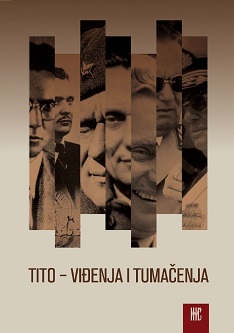Ljudi na strateškim mestima. Uzroci, posledice i smisao sukoba Josipa Broza Tita i Milovana Đilasa na Trećem (vanrednom) plenumu CK SKJ 1954. godine
People in Strategic Posts. Reasons, Consequences and the Meaning of the Conflict Between Josip Broz Tito and Milovan Djiias at the Third (Extraordinary) Plenum of the Central Committee of the Union of the Communists of Yugoslavia in 1954
Author(s): Goran Miloradović
Subject(s): Governance, Political history, Government/Political systems, Post-War period (1950 - 1989), History of Communism, Peace and Conflict Studies
Published by: Institut za noviju istoriju Srbije
Keywords: Josip Broz Tito; Milovan Djiias; dissidence; oppositionalism; factions;
Summary/Abstract: The relation between Josip Broz Tito and Milovan Djiias are analyzed in the paper with speciall stress on the events on the eve, during and after the Third (Extraordinary) Plenum of the Central Committee of the Union of the Communists of Yugoslavia held on January 16-17, 1954. Theoreticaly the question is asked if Djiias realy had the role of a „dissident" in a particular Yugoslav totalitarian state of a stalinist type, since the phenomenon of dissidence in international context is connected with the changes which came about in the USSR after the so-called „Khruschev’s thaw" and since the term itself appeared only in the late 1960s. The period of the dissidents’ activity in the USSR makes up one and a half decade (1965-1980). In virtue of the published and unpublished archival sources, interviews, memoirs and literature, Djilas’s „rebelion" is explained as an episode in the struggle for power within the UCY and not as an ideological dissent of a lonely intellectual. Djiias was a representative of the opposition who tried to use the strategic foreign political turn (Yugoslavia’s rapprochement with the West), as well as ideological and political divisions that followed, for his own ascent in the hierarchy. He tried to achieve that by grouping the intellectual core of his fellow-travelers around the journal Nova misao, militating at the same time for political and ideological competition in Yugoslavia, including the two-party system. By doing that he jeopardized the position of the undesputed leader J.B. Tito, as well as the position of the conservative faction within the UCY. Despite the sympathies of part of the British Labor Party for Djiias, he neither received sufficient support from abroad nor secured a strong enough foothold in Yugoslavia. His policy was defeated at the Third Plenum of the CC of the UCY in 1954 as „anarchism" or „bourgeois liberalism" and he was relieved of all his posts and sent into retirement. By comparing the Soviet and the Yugoslav systems the author concludes that Djilas’s role in Yugoslavia is comparable to the role of the internal party opposition of L. Trotsky and N. Bukharin in the USSR, but not to that of Soviet dissidents who cherished their personal and professional freedom and moral dignity (such as A. Sinyavsky, J. Daniel, A. Solzhenitsyn, R. Medvedev, A. Sakharov etc.) and who were neither revolutionaries nor politicians. Djiias was a revolutionary, a member of the Politbuereau of the CC of the UCY who 230 openly presented his views, formed a faction and gathered increasingly broad support for his policy with the aim of conquering the highest post in Yugoslavia - Tito's. The understanding of Djilas’s status was made blear by the negative propaganda instigated against him by his enemies in power, but also by later positive advertizing of his friends of the opposition, which created two, equally distorted images of Djilas: the „demonic" and the „angelic". However, after a detailed analysis it is clear that the struggle for the supreme power in the Party and in the state was what it was all about, and not just „dissatisfaction" with the existing situation and the system, as was the case with dissidents in other parts of Eastern Europe.
Book: Tito - Viđenja i tumačenja
- Page Range: 199-231
- Page Count: 6
- Publication Year: 2011
- Language: Serbian
- Content File-PDF

